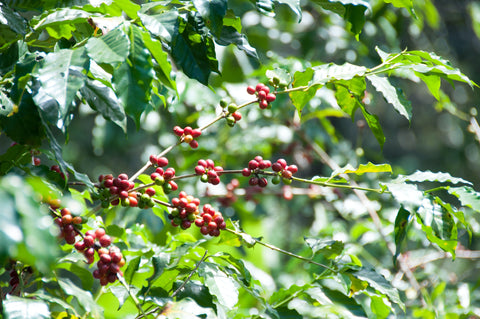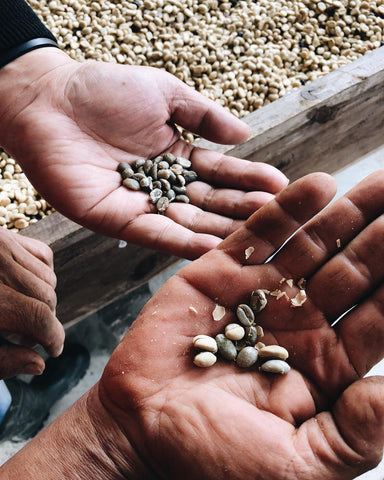Arabica and robusta are the two most common types of coffee beans sold and produced in the world today. But even though they're so common, most people have no idea what the difference is between the two.
We're going to dive into what exactly makes these beans unique, and which one you should pick for your next brew.
Here's a quick crash course on the difference between Arabica and Robusta coffee:
What is Arabica Coffee?
Arabica coffee, also known as Arabian coffee, comes from the Arabica plant and is believed to be the first cultivated coffee species. It makes up roughly 60% of global coffee production. It originates from Ethiopia and is grown worldwide in countries like Brazil and Indonesia, locations with tropical conditions and high elevations that are perfect for Arabica coffee plants. The two most popular varieties of Arabica coffee are Typica and Bourbon.
What is Robusta Coffee?
Robusta Coffee comes from the Coffea Canephora plant and is the second most popular coffee in the world, making up 40% of global coffee production. It originates from sub-saharan Africa and it is largely grown in the east of Africa, Indonesia, and most importantly, Vietnam, who is the leading producer of robusta coffee. The two most popular varieties are Erecta and Nganda.
RELATED BLOG: The Ultimate Coffee Glossary

Arabica vs. Robusta: The Differences
While the two coffees might look similar, these two beans couldn't be more different. Some of the differences include taste, production, and appearance.
Taste
Robusta Coffee: Described to have a bitter, oatmeal-like flavor, with a peanut aftertaste and sometimes tasting of dark chocolate. It has less acidity compared to arabica, meaning it has a harsher and more earthy taste, making it less commonly desired.
Because of this traditional diner coffee taste, robusta is widely used to make espresso, blends, or other dark roasts. It is also commonly used to make instant coffee.
Arabica Coffee: Has a more extensive tasting range, from being soft and sweet to sharp and tangy but most have a fruit-like smell and aftertaste. It also has a higher acidity, which lends arabica a crisp and wine-like taste.
Arabica is “widely considered superior to its counterpart Robusta in flavor complexity, sweetness, balance, and acidity." (Source)
RELATED BLOG: How Do Coffee Beans Get Their Taste?
Caffeine
Robusta: Contains a higher percentage of caffeine per bean (around 2.2 to 2.7%).
Arabica: Contains a lower percentage of caffeine per bean (around 1.2 to 1.5%). A brewed cup of robusta coffee will have more caffeine than a cup of arabica coffee.
Sugar & Lipids
Robusta: Has less natural sugars or lipids compared to Arabica.
Arabica: Has more than half the content of lipids and sugars in comparison to Robusta.
Price
Robusta: Robusta is a lot easier and cheaper to produce, so it's cheaper than arabica coffee.
Arabica: Arabica coffee is more expensive than Robusta because it requires more energy and resources to grow the Arabica coffee plant.

Cultivation
Robusta: One of the great things about the Robusta coffee plant is that it is very resilient. It’s grown at low altitudes and is resistant to pests and disease. The reason why is partly due to the high caffeine content per bean—pests detest the bitter flavor of caffeine and its microbial properties lends itself well in defense of disease.
Arabica: Arabica coffee plants are fragile and require a lot of nutrients. It must be grown at high elevation in cool, sub-tropical climates with lots of moisture, nutrient dense soil, and a balance of both shade and sun. Because of its fragility, Arabica coffee plants are susceptible to pests, cold temperature, or poor handling.

Arabica vs. Robusta: What's Better?
While one isn’t necessarily better than the other, most people seem to prefer Arabica over Robusta because it tastes better. Arabica is smoother and sweeter while Robusta is infamous for its bitter and traditional "coffee" flavor. That being said, it really depends on your flavor preferences.
If you like sweet and fruity flavors, you're more likely to enjoy Arabica, and if you like earthy and bitter flavors, you're more likely to enjoy Robusta. For Arabica coffee, we recommend our Peru Las Damas Coffee, which has notes of dark chocolate, caramel, orange, and lemon.



